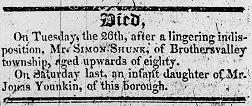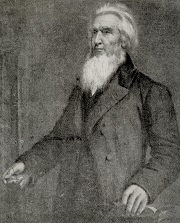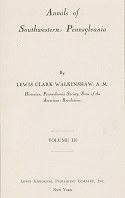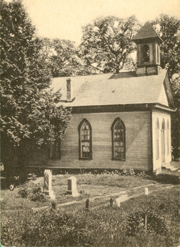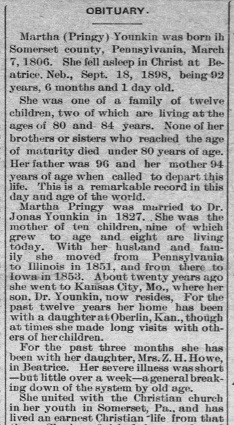
|
Dr. Jonas
Younkin |
| See "A Family’s Influence in Founding the Disciples of Christ Movement in Somerset County, PA" |
Dr. Jonas Younkin was born on June 21, 1803 in Turkeyfoot Township, Somerset County, PA, the son of Jacob and Hannah (Nicola) Younkin Sr. Evidence suggests that his name was pronounced "John-uss." He was but a boy of eight when his father died.
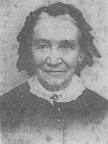
Courtesy YFNB, Jan. 1996
A clergyman, physician and farmer, Jonas was directly involved in establishing the Disciples of Christ movement in Somerset County. Later, he and his wife and large family were pioneer settlers of Illinois and Iowa before alcohol addiction brought on his sad demise.
When the fatherless Jonas reached the age of 14, in August 1817, John Gephart was appointed as his legal guardian. That same year, he was a charter member when "Professor Charles Wheeler and Rev. Dr. Estep organized a church of immersed believers at Somerset," said the 1906 book History of Bedford and Somerset Counties Pennsylvania with Genealogical and Personal History, by E. Howard Blackburn. "This was the Baptist church of Somerset. So far as is known, its charter members were Mary Ogle, Mary Morrison, Mary Graft (the three Marys), Jacob Graft, Isaac and Elizabeth Husband, Samuel Trent, Catherine Carr, Jonas and Martha Younkin, George Probst, Alexander and Nellie Hunter, Susan Stewart, Peggy May, Betsey Kimberly, Sallie Lichtenberger, Dr. Norman and Eliner Bruce, Peter and Barbara Loehr, Jacob and Nancy Sayler."
When he was about 24 years of age, in 1827, Jonas was united in holy matrimony with Martha Pringey (March 7, 1806-1898), one of a dozen offspring of John and Abigail (Rhoads) Pringey, also of Somerset County. Many years later, a newspaper said that "None of her brothers or sisters who reached the age of matury died under 80 years of age. Her father was 96 and her mother 94 years of age when called to department this life. This is a remarkable record in this day and age of the world."
|
Somerset Herald obituary, 1828 |
The Younkins' home in the late 1820s was in the Borough of Somerset. Sadness enveloped the family in late October 1828 when daughter Elvina died in infancy, having lived for only two months. A brief notice of her demise was published in the Somerset Herald.
Circa 1830, Jonas was widely respected in the small farming community for the many hats he wore -- as a farmer and physician as well as a teacher and minister at the Lutheran and Reformed school and church at the crossroads on the David Ream farm at Ursina, Somerset County. This was in a "community in an early day when all the Younkin's spoke the Pennsylvania Dutch," recalled cousin Dr. Jesse "Noble" Younkin of the family of Isaac and Rebecca (Walter) Younkin, in a speech delivered at the 1936 Younkin National Home-coming Reunion in Kingwood, Somerset County, and reprinted in the inaugural Christmas 1937 edition of the Younkin Family News Bulletin.
He had no formal training in medicine but rather learned by observing others and creating home grown remedies. His approach was considered "the New School, as it was known in those days," said a profile of son Edwin in the American Medical Journal. "The reformed practice in that day was in its crudity, and physicians, from necessity, dug their own roots, gathered their own herbs, and prepared their own medicines.... He had his drug-mill, which was made from a section of a large gum tree that in its hollow cavity had fixed two large-mill-stones, and which were made to run by a hand-sweep. [Son] Edwin took much delight in gathering drugs, which grew abundantly in the mountains and valleys, and, after drying, they were ground in the mill." The son "was literally born and reared in a physician's office, where he gained a practical knowledge of medical botany and the methods of compounding drugs according to his father's art."
Cousin Dr. Noble Younkin wrote that Jonas' son Edwin and daughter Emily "went among the hills and gathered the roots and herbs with which [their] father compounded all his medicine. Dr. Jonas Younkin, [the] father, possessed a big blue bottle at that time and from that bottle he sold, skunk oil, bear grease and rattlesnake oil and turtle oil and goose grease and earth worm oil and many other kinds of oil, all owing to what the customer called for, and all out of the same bottle."
More than 150 years after Jonas began his medical practice, he was cited for this work in the Laurel Messenger newsletter of the Historical and Genealogical Society of Somerset County.
~ A Role in Founding the National Disciples of Christ Church Movement ~
|
Rev. Alexander Campbell |
Jonas' church, continued the Blackburn History, "as organized continued as a Baptist church until September 20, 1829, when it was reorganized as a Disciples of Christ, or Christian, church, and it is one of the very oldest church organizations of that denomination." The origins of the new church are well told in the 1939 book Annals of Southwestern Pennsylvania, Vol. III, by Lewis Clark Walkinshaw, drawn from an earlier work, Tale of a Pioneer Church by Peter Vogel: "One of the most interesting religious movements in America had its beginnings in southwestern Pennsylvania, that of the deomination first known as the Disciples of Christ, and latterly better known as the Christian Church."
The Disciples first began to separate from the Baptists when some of the leaders of the Redstone Baptist Association in nearby Washington County, PA sought reforms, circa 1817-1824, led by former Presbyterian ministers Rev. Thomas Campbell and his son Rev. Alexander Campbell, now aligned with the Baptists.
The Campbells made an effort to place preachers in Somerset County and convert entire Baptist church congregations to the new way of worship. Among the targeted churches was the well-established Turkeyfoot Baptist Church in Ursina, also known as the Jersey Baptist Church. In 1817, the Campbells sent preachers into Somerset County, sometimes leading services in the county courthouse. This led to conflict with local Baptists leaders, who rebutted the new wave by saying that the Bible alone was "a sufficient creed." Then in 1822, John Cox, Jacob Graft and John Pringle were dispatched to meet with Jonas, Rev. James Estep of Mt. Pleasant and Jacob Graft of the Jersey Church. Many did not know whether Alexander Campbell was still Baptist, or not. After a number of Baptist churches were expelled, their representatives formed a new "Washington Association." The association met again with Jonas on Sept. 7-9, 1827, in addition to John Prinkey and Jacob Lichliter.
Then in June 1829, Alexander Campbell returned to Ursina to try once more to sway the Jersey Baptists. Said the Annals:
He found them, however, more wedded to Calvin and Baptist usage than to Jesus and his apostles. He returned in the second week in July to Somerset and began his work in earnest. His meetings, as usual, were circulatory. On Thursday, July 9th, he preached at Peter J. Loehr's, four miles east of the village. Chauncey Forward did not feel comfortable about matters, and saddled his horse for a ride to Stoystown, ten miles to the northeast; but somehow he found himself sitting at Loehr's house, the most attentive listener of all. When the invitation to come to Christ was given, he responded eagerly, followed only too gladly by his wife, and also Mr. and Mrs. Alexander B. Fleming. They were all baptized on Friday, July 10th, at the mill below town. Mr. Forward's baptism made no little stir; for he was a prominent lawyer, had served in both houses of the State Legislature, and since 1825 had been in the National House of Representatives. Mr. Fleming was also a lawyer.
|
Walkinshaw's Annals of Southwestern Pennsylvania |
Then on the fateful day of Sept. 20, 1829, after a dozen or more years of work in which our Jonas was involved, Alexander Campbell walked out of a Redstone Baptist meeting and into the nearby woods, where he stepped onto a large rock and began to exhort. He "drew half of the congregation with him, and thus by his dloquent discourse induced them to part with their brethren," said the Annals. "It was a day of historic cleavage, when the great Christian Church, otherwise known as the Disciples of Christ, had their organic formation... There was much bitterness in the discussions at times, but in spite of that, the veteran Baptist, Dr. James Estep, who had been through the controversy with the Campbells, said quite a few years afterwards that if the brethren of the Redstone Association had treated the Rev. Alexander Campbell right, he would never have walked out of the meeting at Big Redstone with the large company that followed him."
The Disciples had no creed but Christ, based solely on doctrines found in the New Testament. Their custom was to partake of Communion at each Sunday service, and adult baptism was by immersion. Alexander Campbell specifically rejected the practices of "the holy kiss, deaconesses, communal living, footwashing and charismatic exercises," said the 1975 book Journey in Faith: A History of the Christian Church (Disciples of Christ), by Lester G. McAlister and William E. Tucker.
|
Jersey Baptist Church, Ursina, PA |
One of the early members of the Christian Church in Turkeyfoot was Jonas' cousin Catherine Minerd and her husband Jacob. At Jacob's death, in 1842, his last will and testament stated that "I earnestly entreat my wife's utmost care respectively in and about the morals and education of my children ... and desire that they be brought up and instructed in the doctrine and religion of the Christian Church." Then when Catherine Minerd died in 1847, rendering their 15-year-old son Eli an orphan, Jonas along with his friend Aaron Schrock were named by the Somerset County Orphans Court as the boy's legal guardians.
For his work founding the Disciples movement in Somerset County, Jonas is named in The Discipline, A Monthly Magazine of Christian Literature, Vol. IV (July-Dec. 1886). The text says he and Harmon Husband “were the first elders. Both could preach pretty well… But emigration thinned them rapidly, the reaper Death claimed his share, 'the beggarly elements of the world' devoured others, and drink got the better of the Doctor, who then went to Iowa for a grave, and so, in the latter part of the fifties, the candlestick was removed.”
Today the Disciples are considered a mainline denomination in the Reformed tradition, with local churches governed by their congregations. National membership as of 2015 was 497,423 within some 3,267 individual congregations across the country. Its official website is http://disciples.org/.
~ Migration to Iowa and Breakup of a Marriage ~
Also in the summer of 1847, Jonas took part in celebrating the Fourth of July -- known as the "National Jubilee" -- in Milford Township. Reported the Somerset Herald, "A liberty pole was erected bearing aloft the star spangled banner, floating on its glorious and ample folds, 'E Pluribus Unum' and cheering the bosom of the American as he responded to the generous sentiment. At an early hour a National salute was fired, and the day ushered in by the waving of plumes, and other demonstrations of lively joy. At ten o'clock the Military, commanded by Capt. John A. Baker, formed, and after passing through a number of evolutions, proceeded to the Grove, followed by a large number of ladies and citizens, when the Declaration of Independence was read, and an Oration delivered by H.B. Barnes, Esq." Jonas was named vice president of the event, and his kinsmen by marriage, John Knable, was appointed secretary.
After years of maintaining a residence in New Lexington, Jonas, Martha and family migrated west to Illinois in 1851. Said the American Medical Journal, "In eighteen days sailing down the Ohio and up the Illinois rivers, the family made the trip to Hennepin, Ills., where they landed, and moved westward." Even while away, he retained ownership of several Somerset County properties and rented them for income. They stopped for two years in Henry County, IL, then in 1853 pushed further into Iowa, settling in or around West Liberty, Muscatine County. Jonas and his sons went to work "driving six to eight yoke of oxen to a huge prairie plough, or in other ways opening up the western farms," said the Journal.
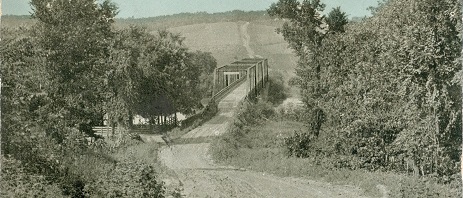 |
Rural Iowa City, at Butler's Landing |
|
Beatrice Daily Express - Find-a-Grave |
During the Civil War, the Younkins were observers as their sons Aaron, Alexander and Walter, and son in law Zimri Howe, joined the Union Army. But after the war ended, for reasons not yet known, Jonas abandoned his wife and Iowa City and went elsewhere, never to return. He is known to have been involved in a legal claim with Iowa City in May 1867, which may have been an instrument of legal separation from Martha.
Jonas did not wait long to marry again. On Dec. 10, 1867, at the age of 64, he was joined in marital union with 47-year-old Jane Harris (1830- ? ). She apparently had been married previously and brought a daughter to the union, 13-year-old Lydia Harris. News of the wedding was published in the Ogle County (IL) Press, which stated that Rev. W.H. Smith had performed the ceremony, and that Jonas was "formerly of Cedar Rapids, Iowa," while Jane was from the town of Polo, IL.
Their son Walter returned home from the Civil War a broken and dying man, stricken with diabetes and gangrene. Martha traveled from her home in Kansas City, MO to nurse him during that time at his home in Annawan, Henry County, IL. For the last seven weeks of his life, she provided constant care at his bedside. She recalled that "he suffered greatly with pains and swelling in the feet and legs, bloating and severe pains in the bowels and kidneys; that he was very restless from the constant and severe pain and that he was confined to his bed all the time she was with him." The son died on Nov. 19, 1868.
Federal census records of 1870 show the Younkins residing in Lyons City, Clinton County, IA, That same year, Martha moved into the home of her married daughter Emily Howe in Iowa City. In the period from 1863 to 1874, Jonas prescribed medications for his son in law Zimri Howe, suffering from Civil War afflictions.
Jonas died sometime after 1880 in Louisa County. He is reputed to be buried in Nichols, Muscatine County, IA, as noted in the Younkin Family News Bulletin (April 30, 1938). Details may be lost to history, and Younkin researchers of the 1930s did not have specific knowledge of his final fate.
~ Martha's Years As a Widow ~
Circa 1878, Martha relocated to Kansas City to live with her son Dr. Edwin Younkin, and in 1880 she moved in with her married daughter Mary Elizabeth Parshall in St. Louis. She uprooted again in about 1886 and moved with the Parshalls to Oberlin, KS, "though at times she made long visits with others of her children," said a newspaper. The final three months were spent with her daughter Emily Howe and husband Zimri in Beatrice, Gage County, NE.
At the age of 92 years, six months and one day, she died in Glenover near Beatrice, Gage County, NE. An obituary in the Beatrice Daily Express said "Her severe illness was short -- but little over a week -- a general breaking down of the system by old age." Funeral services were held in the Howe residence, by the hand of Rev. F.A. Bright. He preached on the scripture Genesis 15:15 (KJV): "Thou shalt go to thy fathers in peace, thou shalt be buried in a good old age."
The Daily Express said that Martha had been "united with the Christian church in her youth in Somerset, Pa., and has lived an earnest Christian life from that time. She has finished her work and gone to her reward. The music was furnished by the ladies' quartet from the Christian church choir, who sang two of the favorite songs, 'Home Sweet Home' and 'Rock of Ages.' The body was interred in the old cemetery." [Find-a-Grave]
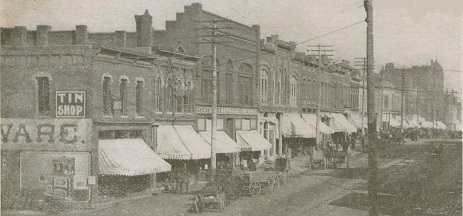 |
North side of Court Street, Beatrice, NE. Published by Springer's Printery |
|
Copyright © 2016-2018, 2024 Mark A. Miner |
|
Research for this page graciously shared by the late Olive (Rowan) Duff, the late Donna (Younkin) Logan and Robert LeFevre Younkin working with Robert J. Libby. |
